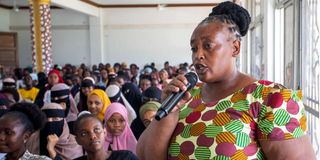Premium
NG-CDF: A case study in political deception

A Mombasa resident giving her views during public participation on the constitution of Kenya Amendment Bill National Assembly Bill No. 4 OF 2025 at Ronald Ngala Hall on May 5, 2025.
In the political theatre of Kenya, few acts are performed with as much flair and deception as the implementation of the National Government Constituency Development Fund (NG-CDF). What was initially designed to bridge the gap between national resources and local needs has been hijacked by self-serving elites. Today, it is less about development and more about political control—a weapon wielded to reward allies and punish dissent.
The evidence is everywhere. Crumbling bridges, collapsing school buildings and phantom roads. At the heart of this failure lies systemic corruption. It is no secret that a large chunk of NG-CDF funds is siphoned off before reaching any real project. Inflated costs, poor quality, and skewed locations are the hallmarks of this rot.
Nowhere is this dysfunction more glaring than in education, NG-CDF’s supposed priority. Picture a school with no books, leaking roofs, and hungry pupils—yet proudly parading a new school bus. This is not development; it is educational malpractice. Article 43 of our Constitution guarantees every child quality education, but quality demands teachers, materials, food, and infrastructure—not cosmetic projects.
Public participation, meant to check such abuse, has become a farce. Forums are stacked with hand-picked loyalists parroting pre-arranged positions. Kenya’s NG-CDF process is performative populism—a staged show to legitimise elite interests.
Even more insidious is the political discrimination at play. Constituencies that vote opposition are denied projects, bursaries, and infrastructure—a form of development apartheid that mocks Article 10’s call for equity and inclusiveness.
The bursary scheme— meant to ensure that no child drops out of school due to poverty—is also perverted: the needy are overlooked while the well-connected thrive, entrenching inequality.
Reform is urgent. The Supreme Court has questioned NG-CDF’s constitutionality, rightly highlighting the conflict when MPs control funds. True change requires shifting oversight to independent, professional bodies and allocating resources based on transparent, needs-based assessments. Kenyans must rise from passive spectators to active defenders of their right to accountable development.
Bernard Mugambi Kanampiu

